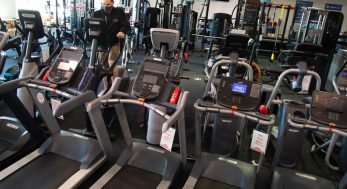Advertisement
Fay Vincent, a former commissioner of Major League Baseball, writes of the blue mood that envelops him when the anniversary of his paralyzing accident approaches, and the lessons wrought from it.

By Fay Vincent
Late in the afternoon on Dec. 10, 1956, when I was an 18-year-old freshman at Williams College, my roommate locked me in my fourth-floor room as a prank. I went out on the ledge outside my dorm window to escape, fell off and broke my back. I was paralyzed, and my life was never the same.
Each year when Dec. 10 looms I think back to that day of my personal infamy, when my life changed in a few seconds. The horror of the injury is tempered by the memories of those who helped my recovery and by the small joys of learning to walk again. But there is no way to ignore the effects of my youthful error of judgment.
I spent about five months in the hospital after several operations to rebuild my back. I was paralyzed from midchest. I was encased in a Stryker frame so I could be rotated onto and off my back every two hours, day and night. It was a tough time. Slowly, with support from family and with fine care, I began to regain the use of my legs. I had been a football player, and my youth and fitness helped. When I was able to walk a bit with crutches I was sent home to continue physical therapy.
Soon after I got home to New Haven, Conn., I was stunned one afternoon when the renowned Yale swimming coach, Bob Kiphuth, surprised me with a visit. I was the son of a former Yale football star, so I knew him slightly. I had once been a part of a small group of aspiring athletes who worked out briefly one summer under his direction.
He was Bob to everyone. He was a small man with a leonine head, a booming voice and a commanding presence. He also had a ready smile, a sense of humor and a wide range of knowledge.
In the swimming universe he was a world-famous expert who had been the Yale coach since the 1917-18 season and pioneered the use of strength training in the sport. At Yale and in the Olympics he had stunning success with his methods. His Yale teams won more than 500 dual meets and lost only 12 times in 42 seasons. He coached a United States swim team at five Olympic Games.
Now he was in my home to ask how he could help with my recovery. He suggested I come to the Yale gym that summer to exercise under his direction. If I made a determined effort with his help, my legs might improve. If I did not make that effort, I would never know whether intense effort might have proved helpful. Medical wisdom at the time posited that a patient with my injury might recover from the nerve damage over the course of two years.
That summer of 1957 he opened the Yale gym for me every day. Daily, he took me to a large workout room that had rubber mats. Along the walls were wooden exercise bars to which were attached rows of pulley weights. Bob favored the repeated use of pulleys with light weights attached. His swimmers would do sets of hundreds of pulls to build strength. He rarely explained the purpose of what he asked me to do. He gave orders crisply, and I obeyed. He also never told me how long a session would last. Pacing myself was thus impossible. He seemed to know when I was exhausted.
At first, the slightest drills were depressing because I was so weak. I had trouble even getting onto the floor mat. I could barely bend from the waist. I could not stand on one leg. Any effort left me panting and bathed in sweat. Bob watched closely but said little. He urged me on and counted as I did the repeats of exercises. His mantra was “Faster” or “O.K., but push yourself.” He was never harsh, but he was demanding. Somehow he made me want to do better to please him. He strolled around the room and seemed distant, but he missed very little and he kept counting.
My injury left my arms with normal motion, and Bob had me use the pulleys for dozens of pulls. He also had me use the pulleys to move my legs. I quickly built up my arms; my legs were the problem. I struggled to do a deep knee bend or to bend from the waist.
When I improved a little, Bob would praise the results but insist “we could do better.” Over the summer, I threw the medicine ball endlessly with his son, DeLaney, the Yale athletic director, whom he dragooned into working out with me. I did leg lifts and walked a little while he preached that pies and cakes were for “fat boys.” Some days I wanted to give up because I was not making much progress. But Bob pretended not to notice my slumping shoulders. He simply bellowed his directions louder.
Many days were grim reminders of how badly damaged I was. If I seemed down he would begin to talk about a political or Yale problem, or a local New Haven issue, to distract me.
Bob taught me the priceless lesson of determination even in the face of poor odds. I simply had to keep working hard even if progress seemed uncertain. Sometimes Bob gave brief sermons on why the health of the body was so vital. He wanted me to do my best with what I had — though he never acknowledged my limitations.
We slowly grew to realize my improvement would be limited. Then he subtly helped me realize I would have to accept what could not be changed.
The summer slid away, and so did my dream of ever running or shagging flies in the outfield or playing football. The physically active life had to surrender to the life of the mind, to Gershwin and Beethoven and to reading and things visual. I would never run but I could think.
I headed back to college at the end of the summer. I did four years of academic work in three to make up for lost time. As years passed, I was able to walk, though I had only a low gear. Bob stayed at Yale and in 1963 was awarded the Presidential Medal of Freedom. He died in 1967. I became a partner in a top law firm, the chairman of Columbia Pictures and the commissioner of Major League Baseball. My success reflected my time with him.
Churchill warned the Dunkirk retreat could not be viewed as a victory and so too I resist the conclusion my accident had benefits. Yet that summer with Bob Kiphuth was a magnificent gift.
Fay Vincent was the commissioner of Major League Baseball from 1989 to 1992.

